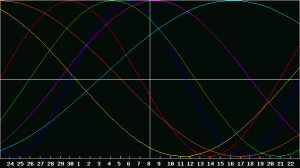The concept of biorhythms was developed in the nineteenth century by
Wilhem Fliess, a German physician, numerologist and friend of Dr.
Sigmund Freud. He believed that everyone is ruled by either a 23-day
(male) cycle or a 28-day (female) cycle. Several other individuals
expanded on Fliess? theory in subsequent years; however, it gained a
rise in popularity during the 1970s after the publication of ?Is This
Your Day? How Biorhythm Helps you Determine Your Life Cycles,? by George
S. Thommen and ?Biorhythm 1979-81 ? A Personal Science,? by Bernard
Gittleson.
Biorhythms are invisible waves of energy
within the human body that are constantly in flux. These energy levels
are unique to each individual and begin charting at birth. It is
believed that people have three main biorhythmic cycles: physical,
emotional and intellectual. Other cycles have been added in recent
years: intuition, spiritual and aesthetic. Some individuals also believe
there are even more cycles that are combinations of the three main
cycles: passion (physical and emotional), wisdom (emotional and
intellectual) and mastery (intellectual and physical).
Biorhythm
charts have been created to graphically track your high and low energy
levels during the cycles. They are generated using an individual?s date
of birth. Each cycle has a ?clock? and critical points within its
timeframe. The clock is the length of time in a given cycle. Critical
points occur when a biorhythm is at the zero line on the chart or when
an upswing shifts to a downswing and vice-versa. Knowing your biological
cycles can help you plan your activities for a specific period of time.
For example, knowing your intellectual cycle can help you schedule
activities requiring mental prowess for times when you are going to be
at a high point in the cycle.
The physical cycle
provides insights into your coordination, strength, well-being and
energy levels. This cycle has a 23-day clock. High points in your cycle
are excellent times to take on physically challenging ventures. Low
points in your cycle indicate that you may be physically spent and need
to take it easy for a while.
The emotional cycle
provides insights into your creativity, sensitivity, mood, perception
and awareness. This cycle has a 28-day clock. High points in your cycle
indicate you are emotionally strong, your outlook on life tends to be at
its best and your interactions with others are most successful. Low
points in your cycle indicate times when you may need to take a step
back, and you are more likely to be depressed.
The
intellectual cycle provides insights into your alertness, analytical
functioning, logical analysis, memory and communication. This cycle has a
33-day clock. High points in your cycle indicate that your mental
faculties are sharp. This is the time for you to seek solutions that
require logic and analysis. Conversely, your intellectual capabilities
are not sharp at the low point in your cycle. You might find it prudent
to delay work that requires serious thought until you reach a higher
point....<<<Read More>>>...
